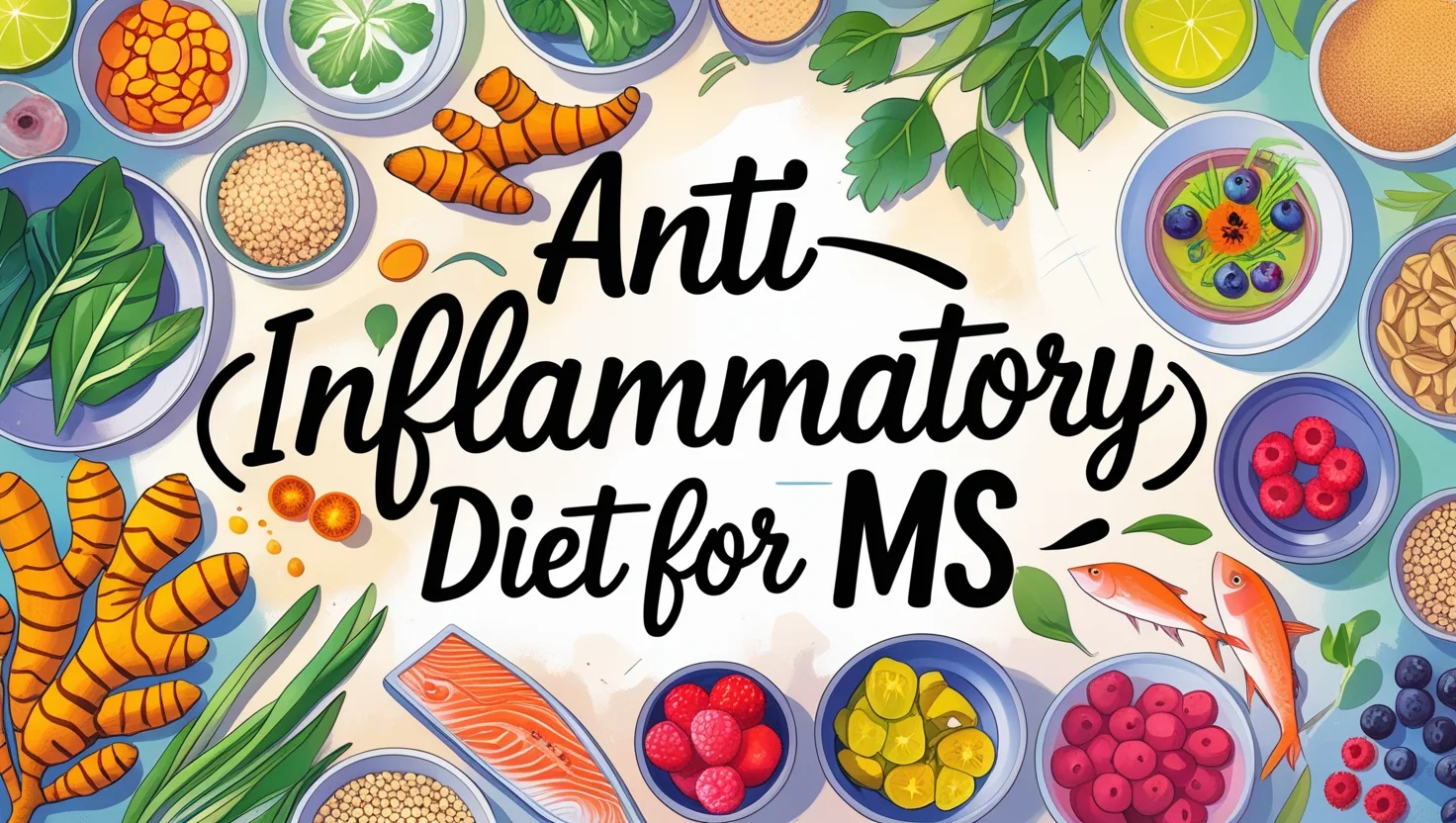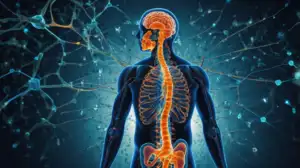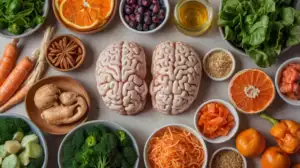Multiple Sclerosis (MS) is a complicated neurological disease affecting the brain and the spinal cord. This compromises the central nervous system (CNS) leading to chronic inflammation in the brain. This results in disability and a whole raft of physical and neurological symptoms. Adopting an anti-inflammatory diet for MS is one way for you to fight back against this debilitating condition. This dietary regime will support immune function and improve your quality of life. Although no diet can claim to cure MS, the link between inflammation and MS highlights the way nutrition is critical to wellness.
As someone who has personally experienced the debilitating symptoms of MS, I can attest to the transformative potential of dietary changes. I concur that an anti-inflammatory diet for MS is a healing diet for multiple sclerosis, but I also firmly believe that a healing mindset is what sets you on a path to recovery. There may be no cure for MS, but if you can eradicate your symptoms, you have achieved the equivalent.
Maintaining a balanced diet for multiple sclerosis symptoms can help manage fatigue, support nerve health, and improve overall well-being.
Table of Contents
ToggleUnderstanding the Role of Diet in Multiple Sclerosis
The connection between diet and MS is, to my mind, irrefutable. A recent study entitled The Role of Diet in Multiple Sclerosis shows compelling links between dietary choices and the progression or remission of symptoms. Diets high in antioxidants, omega-3 fatty acids, and fibre have shown particular promise.
Inflammation is a key factor in MS pathology, and some foods can either exacerbate or reduce inflammatory responses. This makes an autoimmune diet for MS both a preventative strategy and a therapeutic one.
I am a firm believer in the power of the mind. Which is why I think that developing a healing mindset is central to any intervention you can make in your health journey.
A higher intake of omega-3 polyunsaturated fatty acids has been associated with reduced inflammation and improved cognitive function in several neurological conditions.
Anti-inflammatory Diet for MS: Key Principles and Nutrients
The Importance of Whole, Unprocessed Foods
A core tenet of an anti-inflammatory diet for MS is focusing on whole, nutrient-dense foods. This is also a key tenet of the Wahls Protocol, a dietary programme that I have followed with some success. A healing diet should include fresh vegetables, fruits, nuts, seeds, legumes, and whole grains. These foods are rich in antioxidants and phytochemicals that neutralise free radicals and reduce systemic inflammation.
There is evidence that points towards gluten sensitivity as a possible trigger for MS symptoms. While further research is needed, some patients with multiple sclerosis report significant symptom relief after adopting a gluten-free diet.
At one stage of my MS journey, I consulted a gastroenterologist to investigate my possible irritable bowel syndrome (IBS). I had been experiencing prolonged bouts of stomach discomfort.
I don’t remember the precise details, an MS loss of memory. The gastroenterologist advised me that the IBS was definitely not a symptom of MS. I recall that in order to diagnose my irritable bowel, I had to undergo a number of tests. The tests, carried out over a number of months, were inconclusive so I was referred back to the gastroenterologist. This time he begrudgingly admitted it was probably a symptom of MS.
Best Anti-inflammatory Foods for MS
Incorporating anti-inflammatory foods in your diet, can provide crucial nutritional support. Here are some of the best anti-inflammatory foods for MS:
- Leafy greens such as spinach, kale, and Swiss chard
- Fatty fish like mackerel and salmon
- Turmeric, rich in curcumin
- Ginger, which contains gingerol
- Berries, particularly blueberries, which I eat regularly, and raspberries
- Green tea, loaded with catechins
- Extra virgin olive oil
These foods combat oxidative stress and inflammation in the body, promoting better neurological function.
This reminds me of a particular misapprehension I laboured under during the early stages of my MS journey. I assumed that the term neurological referred to nerves. Specifically, the nerves in the peripheral nervous system.
I had overlooked the obvious nerves in the central nervous system, the brain. Oh, how wrong I had been. I had accepted the fact that I might become physically disabled but, I was blissfully ignorant of the mental connotations.
Furthermore, I remember watching a documentary by the late Michael Mosly, he advocated drinking extra-virgin olive oil to improve your heart health. I tried this approach only to find that extra-virgin olive oil burns your throat. I discontinued this experiment fairly swiftly.
Dietary Interventions and Multiple Sclerosis: What the Science Says
A significant number of clinical studies have examined dietary interventions and multiple sclerosis, with promising outcomes. This research shows that diet quality is associated with disability and symptom severity. Adopting a Mediterranean-style or plant-based diet is linked with lower levels of fatigue, depression, and motor dysfunction.
Moreover, the effects of modified anti-inflammatory diet approaches reveal improved quality of life and reduced inflammatory biomarkers in MS communities.
The 2017 revisions of the McDonald criteria have made diagnosis more accurate, allowing doctors to better identify the impact of nutritional interventions on early-stage MS.
The MS Healing Diet: Combining Nutrition with Mindset
Mind-Body Synergy in MS Management
The MS healing diet is more than just food; it’s a comprehensive lifestyle change. Cultivating a positive attitude, my mother who has MS has drilled this into me for many years, and a resilient mindset complements the physical healing process. Mindfulness, meditation, and stress reduction techniques have been shown to positively affect immune regulation.
Meditation is not just a relic of the 60s hippy movement. It is a recognised method for promoting calm in a frantic brain.
Personalised Nutrition Strategies
No one-size-fits-all solution exists. Some patients with multiple sclerosis thrive on a low-saturated fat diet for MS, while others find success with a paleo or ketogenic approach. What remains consistent is the need to reduce inflammation and support the gut-brain axis.
Furthermore, you can train your mind to like healthy foods even when they have been unpalatable since childhood.
Triggers to Avoid: Foods That Exacerbate MS Symptoms
Certain foods are known to increase inflammation and should be limited or avoided. These include:
- Processed meats and trans fats
- Refined sugars and high-fructose corn syrup
- Dairy products (for some individuals)
- Gluten-containing grains (wheat, rye, barley)
- Artificial sweeteners and additives
- Alcohol and excessive caffeine
Higher non-processed red meat consumption has been linked to increased symptom severity. Keeping a food diary can help keep track of your personal triggers.
Often, otherwise healthy foods can trigger MS symptoms. I have had to stop eating mandarins, nectarine and oranges. These healthy citrus fruits would frequently trigger my brain fog and fatigue.
Practical Tips for Integrating the Best Diet for MS Management
Implementing dietary changes can be daunting. Here are some strategies:
- Start small: Replace one inflammatory meal per day with a plant-based option.
- Batch cook meals to ensure consistency.
- Read food labels carefully.
- Prioritise hydration with herbal teas and water.
- Seek guidance from a registered dietitian familiar with autoimmune conditions.
- Plan your meals before visiting the supermarket to avoid impulse buying.
Over time, these steps become second nature, supporting the best diet for MS management.
Frequently Asked Questions
The best anti-inflammatory diet could be a Mediterranean-style or plant-based diet. It should be rich in omega-3 fatty acids, antioxidants, fibre, and phytonutrients.
Skip all processed foods, very difficult in this microwave age, and cut out sugar and dairy. Yes, even those delicious cheeses. Always consult your doctor or a nutritionist before making big changes to your dietary regime.
Foods known to exacerbate MS symptoms are: processed meats, refined sugars, trans fats, dairy and artificial additives. It is also a good idea to limit or cease caffeine and alcohol consumption. Learning to identify and avoid food triggers will become part of your new, healing lifestyle.
There is no individual food that can eliminate inflammation but fatty fish like salmon or mackerel is a strong contender. This is due to its high omega-3 content. You may also like to try turmeric, green tea, and leafy greens.
Adopting an anti-inflammatory diet, exercising regularly, managing stress and getting adequate restful sleep will help moderate MS-related inflammation. You could also consider taking vitamin D and omega-3 supplements. Do not forget to consult your healthcare provider.
Conclusion
Starting an anti-inflammatory diet for MS is a potent defence against worsening MS symptoms, improving general wellness and potentially slowing disease-progression. Scientific thinking supports the link between inflammation and MS, emphasising the importance of dietary interventions.
The MS healing diet promotes the adoption of the best anti-inflammatory foods for MS, while an autoimmune diet for MS helps reduce symptom triggers. This method, coupled with a healing mindset, can ease the lot of one living with multiple sclerosis.
Key takeaways include:
- Choose whole, unprocessed, anti-inflammatory foods.
- Identify and eliminate dietary triggers.
- Combine nutrition with stress management for best results.
- Personalise your dietary plan with professional guidance.
As more is understood about nutrition facts in multiple sclerosis, the opportunity for patients to take control of their health becomes increasingly promising. Remember, while the lab to clinic timeline years may be long, lifestyle changes are available today. Embrace them, and you may find your path to healing.
As an initial sceptic, I can confirm that the right diet will transform your MS prognosis.




